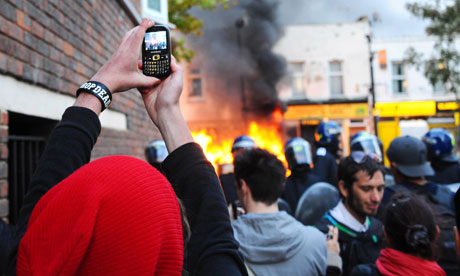
More than two-thirds of adults support the shutdown of social networks during periods of social unrest such as the riots in England this summer, new research has revealed.
A poll of 973 adults carried out for the online security firm Unisys found 70% of adults supported the shutdown of Twitter, Facebook and BlackBerry Messenger (BBM), while only 27% disagreed.
Three-quarters agreed that governments should have open access to data on social network users in order to prevent co-ordinated crime. Support for action against social networks was strongest among over-65s and weakest among 18 to 24-year-olds, who are the heaviest users of the online services.
Several people were convicted of attempting to start disturbances using Facebook during the outbreak of rioting across England in August. The court of appeal recently rejected a bid to lower the sentences of two people sent to prison for four years for attempting to orchestrate riots on the social media site, despite them not leading to any disturbances.
Analysis by the Guardian of 2.5m tweets relating to the riots – part of its Reading the Riots study in conjunction with the London School of Economics – found little evidence to support claims the network had been used to instigate unrest. However, the BBM network was believed to have played a role in organising disturbances.
Freedom of expression campaigners said they were worried that Britons were sanctioning draconian measures as ever more services shift online.
"It's very worrying that people would believe shutting down social networks would be in any way desirable," said Padraig Reidy, news editor of Index on Censorship. "The vast majority of social network use during the unrest was people sreading information and helping each other get home safely. These kinds of actions would weaken the UK's position against authoritarian regimes who censor internet access. As we live more of our lives online, people should be conscious of the amount of power they're potentially handing over to government."
Jonathan Polnay, a barrister in criminal law and member of the Bar Council's IT Committee, said developments across 2011 suggested the UK's legal apparatus was failing to keep pace with technological change.
"We've seen discussions about libel and super-injunctions on Twitter; the use of social networking to coordinate civil unrest in UK cities and a series of high profile attacks on well-known companies which have led to loss of data," he said. "It is important that the law quickly evolves to address issues related to new technology."

